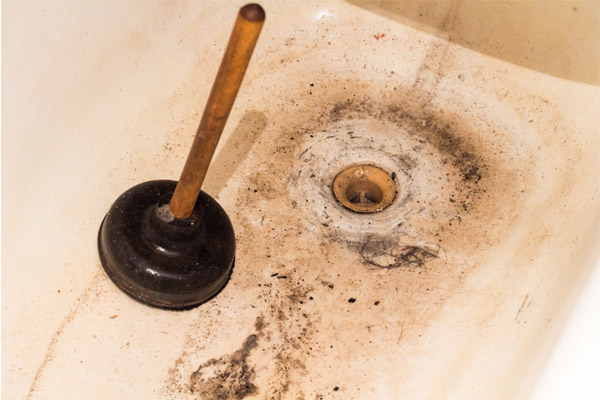Investigating the Causes of Drainage Backflow in the Bathtub
Investigating the Causes of Drainage Backflow in the Bathtub
Blog Article
This article directly below about Why sewage is coming up through your bathtub is unquestionably engaging. Read it for your own benefit and decide what you think about it.

Sewage backup in the bath tub can be a distressing and unhygienic problem for any home owner. Not only is it inconvenient, but it also poses severe wellness threats and indicates underlying concerns with the plumbing system. Understanding why sewage is showing up via the bathtub is essential for taking suitable action to deal with the trouble efficiently.
Introduction to the Concern
Usual Reasons for Sewage Back-up
Obstructions in the Sewage System Line
Among one of the most typical causes of sewer backup is an obstruction in the sewer line. This can occur as a result of the build-up of particles, oil, or foreign things in the pipelines, preventing proper circulation and causing sewage to back up into your bathtub.
Tree Root Breach
Tree origins seeking moisture and nutrients can infiltrate drain lines through tiny splits or joints. Over time, these origins can expand and broaden, creating considerable damages to the pipes and bring about sewage backup problems.
Understanding the Problem
When sewage draws back up into the tub, it's a clear sign of a trouble with the drainage system. The wastewater that must be streaming far from your home is instead locating its back right into your living space, which can cause substantial damages and carcinogen.
Prospective Reasons
A number of elements can contribute to sewage back-up in the bath tub. From clogs in the sewer line to issues with the plumbing framework, determining the root cause is essential for finding a remedy.
Aging Facilities
Older homes might have outdated plumbing systems that are extra at risk to corrosion, fractures, and wear and tear. As pipelines age, they come to be a lot more susceptible to leakages and obstructions, increasing the chance of sewage backup occurrences.
Heavy Rainfall or Flooding
During periods of heavy rainfall or flooding, the drain system might end up being overloaded with excess water, triggering backups and overflows. This can lead to sewage backing up into tubs and other fixtures inside the home.
Indicators of Sewer Backup
Foul Odors
Unpleasant odors emanating from drains pipes or components, specifically in the washroom, might show sewage back-up issues. These smells are frequently strong and relentless, signifying a problem that requires immediate focus.
Slow Draining Fixtures
Bath tubs, sinks, and toilets that drain pipes gradually or not in all could be experiencing sewage back-up. If multiple components are affected at the same time, it's likely that the concern originates from a typical point, such as the primary sewage system line.
Gurgling Noises
Strange gurgling or bubbling sounds originating from drains when water is running elsewhere in your home are indicative of air caught in the plumbing system. This air accumulation can arise from sewage back-up and need to be examined quickly.
Wellness Threats Associated with Sewer Backup
Contamination of Water Supply
Sewer backup can contaminate the water supply in your home, posturing a severe health risk to you and your household. Exposure to contaminated water can lead to intestinal issues, skin infections, and other illnesses.
Mold and mildew Development
Dampness from sewer back-up can produce perfect problems for mold growth in your home. Mold spores can aggravate respiratory system issues and create allergies in delicate individuals, making prompt cleaning necessary.
Spread of Illness
Sewage includes harmful bacteria, viruses, and bloodsuckers that can create a series of conditions, including hepatitis, cholera, and gastroenteritis. Entering into contact with sewer or polluted surfaces places you at risk of infection.
Tidying up After Sewer Backup
Sanitation Procedures
Thoroughly sanitize and sterilize impacted areas after sewer backup to eliminate unsafe germs and prevent mold development. Usage appropriate cleaning products and safety equipment to ensure safe and effective cleanup.
Repair of Influenced Areas
Repair any damage to flooring, wall surfaces, or fixtures triggered by sewer back-up. Depending upon the level of the damages, you may require to replace carpeting, drywall, or various other materials to recover your home to its pre-loss condition.
Immediate Actions to Take
Turning Off Water Supply
In case of sewer back-up, it's vital to shut off the water system to prevent additional contamination and damage. Locate the primary water shutoff valve in your house and shut it off until the issue can be fixed.
Contacting an Expert Plumber
Handling sewage back-up is not a do it yourself work. Contact a certified plumber with experience in taking care of sewage-related concerns to analyze the situation and execute essential repairs or clean-ups.
Staying Clear Of Contact with Polluted Water
Till the sewer back-up is resolved, prevent contact with contaminated water to avoid the spread of germs and microorganisms. Put on safety equipment if you must be in the damaged area and wash your hands extensively later.
Preventive Measures
Regular Maintenance of Drain Lines
Arrange routine assessments and maintenance of your drain lines to determine and address possible concerns prior to they rise into significant troubles. This can consist of cleaning particles, checking for tree origin invasion, and repairing any damaged pipes.
Installing Bayou Valves
Take into consideration setting up bayou valves in your plumbing system to avoid sewer from receding right into your home during periods of heavy rainfall or flooding. These valves immediately close when water draws back up, safeguarding your property from contamination.
Appropriate Disposal of House Waste
Prevent purging anything besides toilet tissue and human waste down the bathroom to prevent blockages and obstructions in the sewage system line. Dispose of grease, oil, and other family chemicals correctly to reduce the risk of plumbing problems.
Why is there sewage coming up from my bathtub?
These gas fumes, like hydrogen sulfide – the gas that leaves a rotten egg smell in its wake and is highly flammable and toxic – can be hazardous to your health. Sewage poses major health risks as it contains harmful bacteria and microorganisms that can be dangerous if exposed to them.
Sewage cleanup should be considered an emergency.
So, why is there sewage coming up from your bathroom? There are several common causes of a sewage backup.
The most common reason for sewage coming up through your bathroom is a clogged sewer line. All plumbing in your bathroom connects to a single drain pipe that leads to the sewer line under your house. This drain line carries all wastewater and sewage away from your home to the city’s sewer system.
When the sewer line becomes clogged or blocked, wastewater has nowhere to go but back toward your house. This results in sewage coming up through your drains, often starting with your tub or shower.
Another culprit may be the sewage ejector pump, which is used when a bathroom, laundry room or any other type of plumbing fixture is located below the level of the main sewer or septic line flowing from the house. Most commonly, ejector pumps are used in homes with basement bathrooms or laundry rooms.
When you experience sewage coming up through your bathtub, it’s always best to contact a professional. Attempts to fix a clogged sewer line without experience often lead to more plumbing damage.
Make sure that no one enters the affected area, and open as many windows as possible. Pre-treat the flooded area with small splashes of chlorine bleach. Wear protection gear like rubber gloves, a mask, and water-resistant coveralls.
https://www.shawlocal.com/the-herald-news/sponsored/2022/08/17/omega-plumbing-10199038/

We had been made aware of that editorial on Water Coming up Bathtub Drain through a buddy on a different site. Sharing is nice. You won't know, you may be doing someone a favor. I value your readership.
Free Quote
Report this page